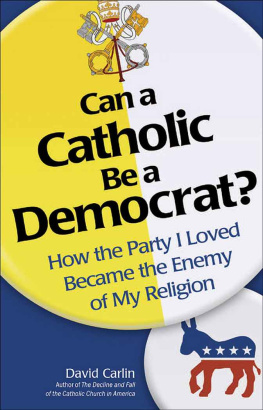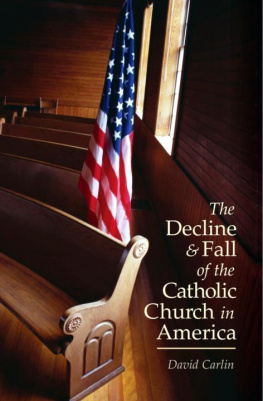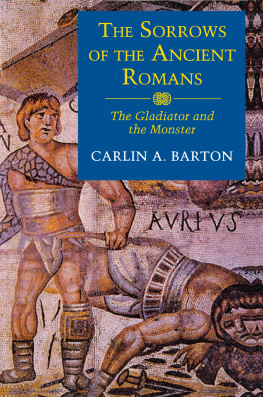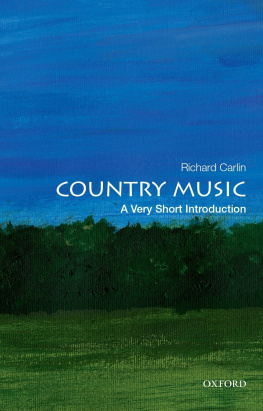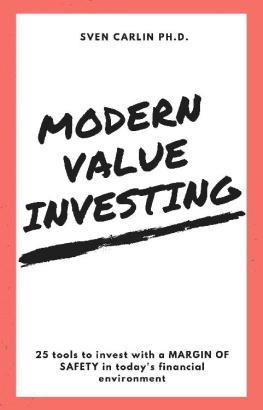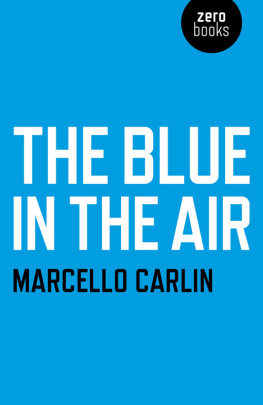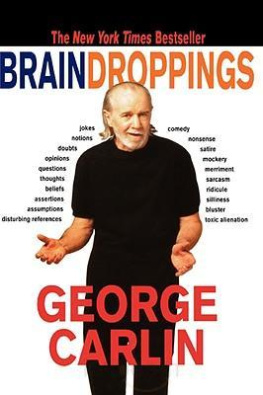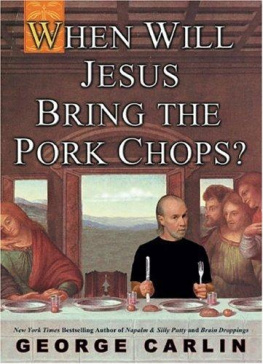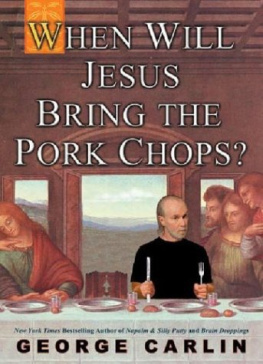David Carlin - Can a Catholic Be a Democrat?
Here you can read online David Carlin - Can a Catholic Be a Democrat? full text of the book (entire story) in english for free. Download pdf and epub, get meaning, cover and reviews about this ebook. year: 2012, publisher: Sophia Institute Press, genre: Politics. Description of the work, (preface) as well as reviews are available. Best literature library LitArk.com created for fans of good reading and offers a wide selection of genres:
Romance novel
Science fiction
Adventure
Detective
Science
History
Home and family
Prose
Art
Politics
Computer
Non-fiction
Religion
Business
Children
Humor
Choose a favorite category and find really read worthwhile books. Enjoy immersion in the world of imagination, feel the emotions of the characters or learn something new for yourself, make an fascinating discovery.
- Book:Can a Catholic Be a Democrat?
- Author:
- Publisher:Sophia Institute Press
- Genre:
- Year:2012
- Rating:4 / 5
- Favourites:Add to favourites
- Your mark:
- 80
- 1
- 2
- 3
- 4
- 5
Can a Catholic Be a Democrat?: summary, description and annotation
We offer to read an annotation, description, summary or preface (depends on what the author of the book "Can a Catholic Be a Democrat?" wrote himself). If you haven't found the necessary information about the book — write in the comments, we will try to find it.
Can a Catholic Be a Democrat? — read online for free the complete book (whole text) full work
Below is the text of the book, divided by pages. System saving the place of the last page read, allows you to conveniently read the book "Can a Catholic Be a Democrat?" online for free, without having to search again every time where you left off. Put a bookmark, and you can go to the page where you finished reading at any time.
Font size:
Interval:
Bookmark:
Can a Catholic Be a Democrat?
How the Party I Loved Became the Enemy of My Religion
David R. Carlin
SOPHIA INSTITUTE PRESS
Manchester, New Hampshire
Copyright 2006 David R. Carlin
Printed in the United States of America
All rights reserved
Cover design by Theodore Schluenderfritz
No part of this book may be reproduced, stored in a retrieval system, or transmitted in any form, or by any means, electronic, mechanical, photocopying, or otherwise, without the prior written permission of the publisher, except by a reviewer, who may quote brief passages in a review.
Sophia Institute Press
Box 5284, Manchester, NH 03108
1-800-888-9344
www.SophiaInstitute.com
Can a Catholic be a Democrat? : how the Party I loved became the enemy of my religion / David R. Carlin.
p. cm.Includes bibliographical references.
ISBN-13: 978-1-933184-19-7 (pbk. : alk. paper)
1. Christianity and politics Catholic Church. 2. Christianity and politics United States. 3. Democratic Party (U.S.) I. Title.BX1793.C32 2006
324.2736 dc22200601907506 07 08 09 10 9 8 7 6 5 4 3 2 1
Also from Sophia Institute Press by David R. Carlin:
The Decline and Fall of the Catholic Church in America
This book is dedicated to:
David R. Carlin, Sr. (1909-1980)
Marion McGetrick Carlin (1911-1989)
Maureen Carlin Fitzgerald (1945-2003)

Publishers Note
A few months ago, I mentioned to a conservative Catholic friend that we planned to entitle this book Can a Catholic Be a Democrat?
My friend shot back, Can a Catholic be a Republican?
Thats a fair question, but its the subject of a different book. For our purpose here is not to endorse particular candidates, affect elections, or even support a particular party. (Like most Catholics today, we dont agree completely with any of them and we dont even agree with all of our authors political assumptions.)
Our effort transcends prudential judgments about war and peace, wealth and taxes, and the persons vying for office today; its deeper than any particular issue, contest, or political philosophy.
In a word, in publishing this book our purpose is Catholic. We hope by means of it to help Catholics see clearly the political choices they face, so that they can prudently work for policies consistent with the fundamental truths of the Catholic Faith.
As this book goes to press, we hear reports of shifts in the electorate. Stalwart conservatives and even many Republican moderates have begun to question their allegiance to the GOP; lifelong Democrats find it ever harder to vote Democratic. Catholics in both parties have wandering eyes and are open to being courted by political parties they might never have supported before.
To help them choose, and to help the parties themselves understand Catholics better and win their votes, author David Carlin here shows what it means to be Catholic in the public square. He explains the fundamental policies that Catholics must support and identifies ones that Catholics will never abide.
His arguments might not lead you to a more Catholic party, but they will help you make your party less hostile to the beliefs of Catholics.
And whether youre Catholic or not if you seek to win elections, you need to do just that. For in many elections, Catholics are the swing voters who determine the outcome.
The party that hears Carlins voice today will win elections tomorrow.

Acknowledgments
In writing this book I have been aided by many people. First of all, thanks to Todd Aglialoro, my remarkably talented editor at Sophia Institute Press, who worked on both this book and my previous book (The Decline and Fall of the Catholic Church in America) . Thanks to Professor John Quinn of Salve Regina University, who read an earlier draft of this book and supplied many helpful comments. Thanks to former Rhode Island state Representative Spencer Dickinson, who also read an earlier draft and was the first to suggest an autobiographical framework. Thanks to the late Bill Kinnaman, a teaching colleague of mine who was both a professor of philosophy and an Evangelical minister. A month or two before his death Bill made a number of helpful comments on my Liberal Christianity appendix. And thanks above all to the woman who was my earliest political partner and has been the great love of my life: my wife, Maureen.

Preface
We love our friends, but we love the truth more.
Aristotle, Nicomachean Ethics
This book is a complaint from a disappointed lover. Its possible to love institutions as well as persons, and I once loved the Democratic Party the party of Franklin Roosevelt and his New Deal liberals, the party that once upon a time did wonderful things for blue-collar Americans like my parents, the party that helped immigrant Catholics and their children (my parents again) become real Americans. Later on Ill tell the story of my love affair with the party and my gradual disillusionment, but for now let me simply record the fact that Im writing with the political equivalent of a broken heart.
I havent taken up with another party; that is to say, I havent become a Republican. In fact, I havent yet left the Democratic house: Im still a registered Democratic voter, I always vote in Democratic primaries here in Rhode Island, and I continue to participate actively in Democratic politics at the local level. But at the national level, and to a limited extent even at the state level, I find less and less to love in my party as it is today, and sometimes I have no choice but to vote for Republican candidates for high office. I think, or at least I hope, that someday the Democratic Party will once again become a loveable thing. But it takes a long, long time for a political party to change its orientation, and since Im now in my late sixties, I doubt that the change I look for will take place in my lifetime. I expect to die a Democrat, albeit a very unhappy one.
The reasons for my unhappiness and not just mine but the unhappiness of millions I will explain in detail in the following pages. But a short way of putting the thing is to say that in the great Culture War currently going on between old-fashioned Christians and anti-Christian secularists, over issues such as abortion, same-sex marriage, euthanasia, and the role of religion in society, my Democratic Party has opted to side with the secularists.

I write this book as a Catholic who fears for the future of Christianity in America, but also as a Democrat who fears for the future of the Democratic Party. Already it has experienced a great decline, a decline that first became clear in the election of 1980, when Ronald Reagan, with great help from religious conservatives (many of them Democrats), won the White House and the Republicans gained control of the U.S. Senate.
True, since that time the Democrats have experienced episodes of prosperity, Bill Clintons presidency being the most notable, but the long-term trend is clear. The Democrats used to be Americas number-one party; theyre now the number-two party; and if they continue to alienate religious and moral-conservative voters, theyre likely to remain number two for a long time to come.
As the Civil War approached, the Democrats took the wrong position on slavery, and they found themselves, except for a few brief episodes of prosperity, Americas minority party from the election of Abraham Lincoln in 1860 until the election of Franklin Roosevelt in 1932. At the time of the Great Depression of the 1930s, the Republicans took the wrong position on the social and economic welfare responsibilities of the federal government, and they remained Americas number-two party until the coming of Reagan and Newt Gingrich in the 1980s and 90s. Today the Democrats are taking the wrong position on morality and religion, which may doom them to remain Americas minority party until well into the twenty-first century.
Next pageFont size:
Interval:
Bookmark:
Similar books «Can a Catholic Be a Democrat?»
Look at similar books to Can a Catholic Be a Democrat?. We have selected literature similar in name and meaning in the hope of providing readers with more options to find new, interesting, not yet read works.
Discussion, reviews of the book Can a Catholic Be a Democrat? and just readers' own opinions. Leave your comments, write what you think about the work, its meaning or the main characters. Specify what exactly you liked and what you didn't like, and why you think so.

